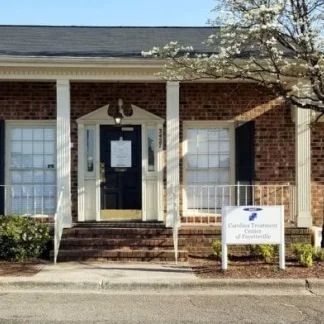Carolina Outreach
Carolina Outreach is located in Fayetteville, North Carolina. Carolina Outreach ...
Carolina Treatment Center is a private rehab located in Fayetteville, North Carolina. Carolina Treatment Center specializes in the treatment of alcoholism, drug addiction, opioid addiction, and substance abuse.
Contact us for more information: (910) 864-8739

Connect with Carolina Treatment Center by calling their admissions team directly.
(910) 864-8739 Website Get DirectionsThe Substance Abuse and Mental Health Services Administration (SAMHSA) is a branch of the U.S. Department of Health and Human Services. Established in 1992 by congress, SAMHSA's mission is to reduce the impact of substance abuse and mental illness on American's communities.
SAMHSA Listed: Yes
Group therapy is any therapeutic work that happens in a group (not one-on-one). There are a number of different group therapy modalities, including support groups, experiential therapy, psycho-education, and more. Group therapy involves treatment as well as processing interaction between group members.
Trauma therapy addresses traumatic incidents from a client's past that are likely affecting their present-day experience. Trauma is often one of the primary triggers and potential causes of addiction, and can stem from child sexual abuse, domestic violence, having a parent with a mental illness, losing one or both parents at a young age, teenage or adult sexual assault, or any number of other factors. The purpose of trauma therapy is to allow a patient to process trauma and move through and past it, with the help of trained and compassionate mental health professionals.
Trauma therapy addresses traumatic incidents from a client's past that are likely affecting their present-day experience. Trauma is often one of the primary triggers and potential causes of addiction, and can stem from child sexual abuse, domestic violence, having a parent with a mental illness, losing one or both parents at a young age, teenage or adult sexual assault, or any number of other factors. The purpose of trauma therapy is to allow a patient to process trauma and move through and past it, with the help of trained and compassionate mental health professionals.
Carolina Outreach is located in Fayetteville, North Carolina. Carolina Outreach ...
Lighthouse Counseling Center is a private rehab located in Fayetteville, North C...
Greater Image Healthcare is a private rehab located in Fayetteville, North Carol...
Precious Haven – Breezewood is a private rehab located in Fayetteville, North Ca...